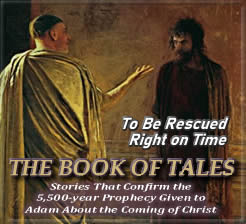Pilate: as The Public Defender (Cont’d)
From Enemy to Ally (Cont’d)
A complex man of startling contradictions in life, Pontius Pilate would prove to be just as enigmatic in death. The father of church history, Eusebius of Caesarea, the fourth-century Roman bishop, laid claim to his own version. According to him, several years after the crucifixion, Pilate fell out of favor with Caligula and was exiled to Gaul, where he supposedly committed suicide. In contrast, Eastern Orthodox tradition—in its attempt to remold the image of the soldier-turned-politician—has Pilate committing suicide not because of his failure as a Roman governor, but because of a guilty conscience. In this newly-acquired role of sinner-become-saint, Pilate, like Saul of Tarsus who was converted from an enemy of God to His greatest ally, this tradition—so alien to the Western theological mind—portrays the governor as a changed man. Smitten to the core for his complicity in the death of an innocent Man, Pilate, like Judas before him, is guilt-ridden for having caved in to the Jewish leaders rather than following his own instincts and releasing Jesus.
Apart from the traditional version of events surrounding the life and death of Pilate, there is the apocryphal record, which provides us with alternative views that are not found in The New Testament. One of these accounts is given by Justin Martyr, the second-century Greek Christian apologist, in a letter to Augustus Caesar:
After Jesus was crucified, they cast lots for His robe… And that these things happened, you can ascertain from The Acts of Pontius Pilate.1
And again:
With regard to the predictions that our Christ would heal all diseases and raise the dead, listen to what was said. “At His coming the lame will leap about like a deer, and the tongue of the stammering one will be made to speak clearly. The blind will see, the lepers will be cleansed, the dead will rise and walk about.” And that He did those things, you can learn from The Acts of Pontius Pilate.2
According to this account, and several others written in the same vein, Pilate is not nearly as ambiguous as the gospel writers have portrayed him. To be sure, he is still the cynical politician, just as the canonical writers have characterized him. In this version, however, there is an added dimension to Pilate’s character in that he is genuinely compelled by the unique personality of Jesus. In response, the once-hardened governor is moved to completely rethink his attitudes about ultimate reality, even going so far as to testify to this change of heart in a series of letters to the Roman emperor Tiberius Caesar. In variance to tradition, Pilate does not take his own life but is instead portrayed as a martyr of the faith. After being put on trial for allowing Jesus to be crucified, he is beheaded by order of Tiberius for his perceived complicity in Christ’s death. Undoubtedly as a result of such testimony, the Ethiopian Orthodox Church elevated Pilate to the status of a saint, celebrating his feast day ever since on June 25th.
Story Continues Below
Says Richard Price—the founder and CEO of Academia.edu—on his podcast In Depth With Academia:
Tales of Forever: The Unfolding Drama of God’s Hidden Hand in History is:
To hear Price’s book review of Tales of Forever, CLICK HERE.
To hear Kent talk about the little-known biblical prophecy, which speaks of the 5,500-year chronology from Adam to Christ, with Zen Garcia, the host of the Internet talk show Secrets Revealed, CLICK BELOW.
Story Continues From Above
The Threshold Guardian
Considering all the bewildering contradictions surrounding Pontius Pilate, what can one take away from them? Should history continue to condemn him as a villain? Or should it praise him as a saint? Once again, it appears that just as the traditional record portrays the issue without a bias one way or the other, history may never be able to provide us with a definitive answer. One thing, however, is certain. Pontius Pilate, good or bad, active or passive, stubborn or moved, did perform a necessary task in the plan of God. When Jesus refused to defend Himself, Pilate asked, “Why won’t you talk to me? Don’t you know I have the power to either release you or crucify you?”3
At that moment, Pilate represented what Joseph Campbell, the twentieth-century American mythologist, would call a threshold guardian. In the life of every great hero, a formidable foe seeks to thwart his attempt to fulfill his destiny. As Campbell described it, “The hero goes forward in his adventure until he comes to the threshold guardian at the entrance of magnified power… Beyond that is darkness, the unknown, and danger.”4 In Greek mythology, Medusa represented just such an obstacle for Perseus, who sought to free Andromeda from the clutches of a sea monster, whereas for Jason, the sleepless dragon barred the way in his effort to retrieve the Golden Fleece. In this respect, Jesus was no different than any of these other great heroes. For Him, Pontius Pilate represented this threshold guardian. Like Satan in the wilderness, who tempted Christ to use His divine power in ways that would have ultimately derailed Him from His true path, Pilate offered Jesus an easy way out from the roadmap that God, the Father, had laid out. Yet the journey and its inevitable conclusion were already fixed in the mind of Jesus. He knew there was no other way for Him to fulfill His destiny. Said Jesus to His disciples, “No man takes My life, but I lay it down on My own. I have the authority to lay it down and the authority to take it back up again. This command I’ve received from My Father.”5
And when Pilate presumed that he, as the appointed prefect of Imperial Rome, was the one who held the life of Christ in his puny, human hands, Jesus did exactly what all great heroes have done before Him. He transformed the threshold guardian before Him from a potential obstacle into an unwitting ally. The unsuspecting governor, a man who had, until that very moment, been someone who had bullied, plundered, and murdered his way to a place of tremendous political power, was with one simple response from this peculiar Man turned inside out, never to be the same again. The man who thought that he alone held the power of life and death was simply told by Jesus: “But you’d have no power over Me if it hadn’t been given to you from above. Therefore, the one who handed Me over to you is guilty of an even greater sin.”6
Upon hearing such a reply, Pontius Pilate, the Scripture points out, became at that moment a new person. Suddenly he was a man who was moving in a new direction, a man with a new purpose. “From then on,” said the Apostle John, “From then on, Pilate tried to set Jesus free, but the Jews kept on shouting, ‘If you let this man go, you’re no friend of Caesar! Anyone who claims to be a king opposes Caesar!’ And when Pilate heard this, he brought Jesus out, and declared to all the Jews there: ‘Here is your king!’”7








